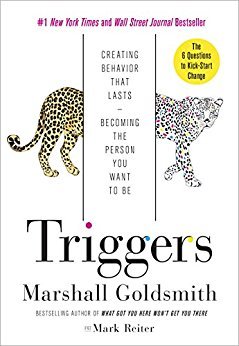More on this book
Community
Kindle Notes & Highlights
We can change not only our behavior but how we define ourselves. When we put ourselves in a box marked “That’s not me,” we ensure that we’ll never get out of it.
Where a well-designed feedback loop triggers desirable behavior, our environment often triggers bad behavior, and it does so against our will and better judgment and without our awareness. We don’t know we’ve changed.
Smoking cigarettes is a habit loop consisting of stress (cue), nicotine stimulation (routine), leading to temporary psychic well-being (reward). People often gain weight when they try to quit smoking because they substitute food for nicotine as their routine. In doing so, they are obeying Duhigg’s Golden Rule of Habit Change—keep the cue and reward, change the routine—but they are doing it poorly. Doing thirty push-ups (or anything physically challenging) might be more effective than eating more.
Paradoxically, the big moments—packed with triggers, stress, raw emotions, high stakes, and thus high potential for disaster—are easy to handle. When successful people know it’s showtime, they prepare to put on a show. It’s the little moments that trigger some of our most outsized and unproductive responses: The slow line at the coffee shop, the second cousin who asks why you’re still single, the neighbor who doesn’t pick up after his dog, the colleague who doesn’t remove his sunglasses indoors to talk to you, the guests who show up too early, the passenger in the next seat wearing super-loud
...more
Now ask yourself this: When has your day ever worked out note for note as you planned it?
Whether you’re leading other people or leading the follower in you, the obstacles to achieving your goals are the same. You still have to deal with an environment that is more hostile than supportive. You still have to face other people who tempt you away from your objectives. You still have to factor in the high probability of low-probability events. And you still have to consider that as the day goes on and your energy level diminishes, your motivation and self-discipline will flag.
The boxer-philosopher Mike Tyson said, “Everyone has a plan until they get punched in the face.” As we wander through life, what punches us in the face repeatedly is our environment.
Forecasting is what we must do after acknowledging the environment’s power over us. It comprises three interconnected stages: anticipation, avoidance, and adjustment.
Peter Drucker famously said, “Half the leaders I have met don’t need to learn what to do. They need to learn what to stop.”
Part of the reason is inertia. It takes enormous willpower to stop doing something enjoyable.
It is phrased in the form of a question you should be asking yourself whenever you must choose to either engage or “let it go.” Am I willing, at this time, to make the investment required to make a positive difference on this topic? It’s a question that pops into my head so often each day that I’ve turned the first five words into an acronym, AIWATT (it rhymes with “say what”). Like the physician’s principle, First, do no harm, it doesn’t require you to do anything, merely avoid doing something foolish.
The common sense comes from Peter Drucker, who said, “Our mission in life should be to make a positive difference, not to prove how smart or right we are.”
From wake-up to bedtime, when we’re in contact with another human being, we face the option of being helpful, hurtful, or neutral. If we’re not paying attention we often choose hurtful, largely to prove we’re smarter, better, more right than the “other guy.”
Another Peter Drucker quote changed my life. I tell it to everyone I coach, some would say over and over again: “Every decision in the world is made by the person who has the power to make the decision. Make peace with that.”
But it’s also a reminder about power: decision makers have it, the rest of us don’t. Sometimes the decision makers’ choices are logical and wise, other times irrational, petty, and foolish. That doesn’t change the fact that they are still the decision makers. It’s the rare person who can make peace with that fact. From the schoolkid complaining about a teacher’s grade to the teen sulking about a parental grounding to the rejected suitor moaning about a lost love to an imperious CEO ignoring his board’s directives, we go through life grumbling about what should be at the expense of accepting
...more
Dealing all day with difficult, high-maintenance colleagues is depleting. Maintaining a compliant façade around a leader you don’t respect is depleting. Excessive multitasking is depleting. Trying to persuade people to agree with you when they are inclined to oppose you is depleting. So is trying to make people like you when they are predisposed to dislike you. Suppressing your opinions—or for that matter, engaging in any effort to control your emotions around others—is depleting.
But the effect isn’t pretty. Under depletion’s influence we are more prone to inappropriate social interactions, such as talking too much, sharing intimate personal information, and being arrogant. We are less likely to follow social norms; for example, we are more likely to cheat. We are less helpful. We can also be more aggressive; the effort of curbing our normal aggression depletes our self-control over that impulse. Conversely, we can also be more passive; when our intellectual resources are sapped, we are more easily persuaded by others and less adept at coming up with counterarguments.
“Am I willing at this time to make the investment required to make a positive contribution on this topic?”


